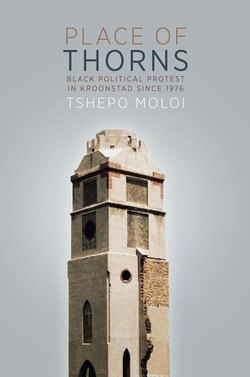Читать книгу Place of Thorns - Tshepo Moloi - Страница 7
На сайте Литреса книга снята с продажи.
ОглавлениеAcknowledgements
The completion of this book would not have been possible without the assistance, support, encouragement, constructive criticism and intellectual guidance of numerous individuals. I would like to thank all the people who generously supported me during the course of my field work and writing of this book.
First, I would particularly like to express my deepest gratitude to Professors Noor Nieftagodien and Phil Bonner for persuading me to agree to convert my PhD thesis to a book and for their continuous encouragement. I would also like thank Prof. Nieftagodien for his insightful understanding of the ‘local’ politics; it changed my narrow view.
I am deeply grateful to Profs. Clive Glaser, Sekibakiba Peter Lekgoathi, Mucha Musemwa and Dr. Maanda Mulaudzi for their intuitive comments at the seminars organized under the ‘Local Histories and Present Realities’ programme. Thanks also to Dr Sifiso Mxolisi Ndlovu and Prof. Linda Chisholm for their significant contribution, particularly to chapter three of my thesis, which part of it was published in the Southern African Historical Journal, Volume 63, Number 1, March 2011.
Many thanks also to all the staff and post-graduate students in the ‘Local Histories and Present Realities’ programme for their support and encouragement. Zahn Gowar, administrator in the programme did a splendid work in assisting me through the course of research and writing up. I also appreciate the constant encouragement I received from Drs Arianna Lissoni and Franziska Rueedi.
I am deeply indebted to Ntate Mpopetsi Jonas Dhlamini and Ntate Michael “Baba” Jordan for their interest in my study and unfailing support. Ntate Dhlamini, in particular, greatly assisted me in identifying and making contacts with potential interviewees, and later conducting some of the interviews for me. I am also grateful to my friend Dr. Chitja Twala, whose support never flagged.
I am most thankful to the financial support from the National Research Foundation Chair in History, the Faculty of Humanities at the University of the Witwatersrand, and the Ford Foundation. Many thanks also to the staff of the University of the Witwatersrand Libraries, especially the Historical and Literary Papers and the South African History Archive, for their help in all my enquiries.
I am deeply grateful for permission to use the South African Democracy Education Trust’s interviews. Thanks also to Dr. Twala for allowing me to use some of his interviews. The late Pule “Yster” Moino, Dr. Anthony Bouwer and Ntate Dhlamini, I thank you for unselfishingly making available your reading materials on Kroonstad. I would also like to thank all the residents of Kroonstad who gave me permission to use their phoographs, and in helping to locate them.
Tshegofatso Leeuw, Plantinah Dire and Molefe Mahautsa helped with transcribing and translating the interviews; and Esmeralda Dicks and Malebone Rapoo did a splendid job in translating some of the Afrikaans materials to English. Without your assistance this book would not have come to completion.
Much of the success of this book is the result of the people who read and commented on the manuscript, especially the anonymous readers; and the editors Pat Tucker and Monica Seeber. I am grateful to the Wits University Press for undertaking to publish this book. Roshan Cader and Andrew Joseph helped in steering the process of the publication.
I take this opportunity to thank my family, especially my parents, Stoffel and Edith, for their understanding and unwavering support under trying times. To my brothers, Thabo, Tebogo and Kagiso, thank you for your constant enquiries about the progress of the book. My special thanks are also due to Asania Aphane and our daughter Thato.
Lastly, but not least, I owe a great deal of gratitude to the residents of Kroonstad’s black townships, who this study is about. Their patience, openness, friendship and trust spurred me on. I owe particular thanks to Ntate Ngope Motaung, Andre Kotze at the Moqhaka Municipality Archives, and Ntate Mokete Victor Duma, the former municipal manager of Moqhaka municipality, for granting me permission to use the municipality’s archives. I am particularly grateful to Ntate Motaung for his relentless assistance in accessing these archives. A great deal of gratitude is owing to all my interviewees (their names are listed below). Without your support and cooperation this work would not have been possible. Thank you very much.
